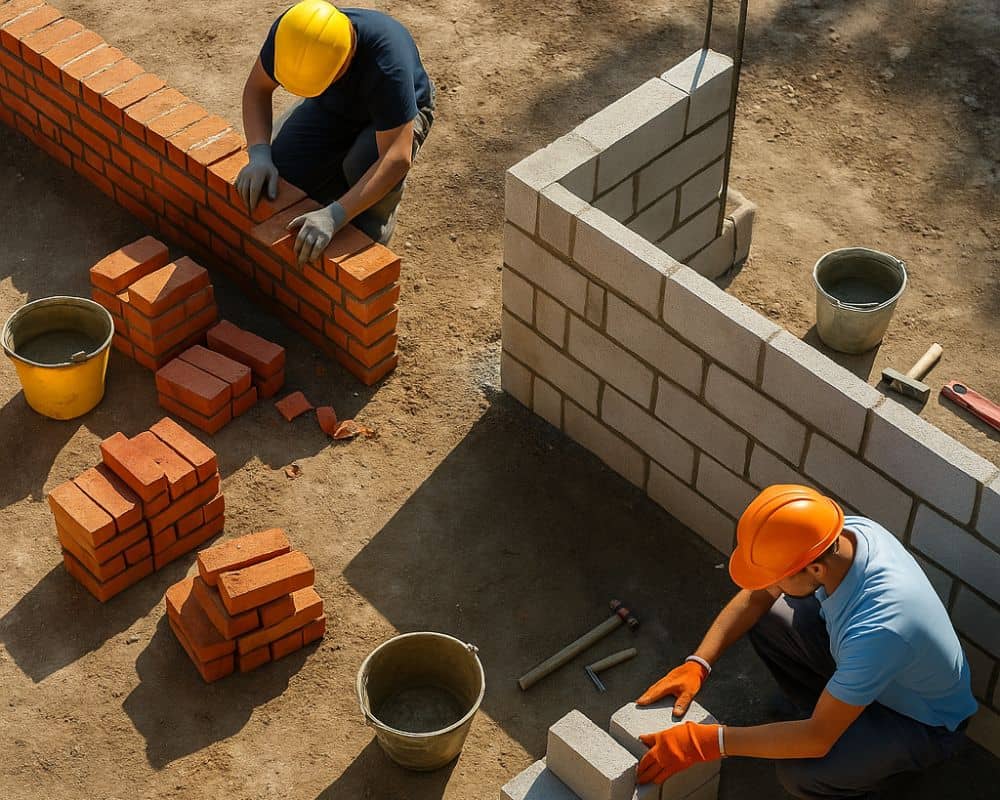
Choosing the right building material is a big decision when starting any construction project. Two of the most common options—brick masonry and concrete block—are often compared because they’re both strong, durable, and widely available. But they have key differences that could affect the outcome of your project.
Whether you’re building a home, garage, wall, or outdoor feature, this guide will help you understand which material works best for your needs, budget, and style.
What Is Brick Masonry?
Brick masonry uses fired clay bricks that are laid in a pattern and bonded together with mortar. These bricks are known for their classic look, strength, and long lifespan. Brick walls can be decorative, load-bearing, or both, and are often seen in homes, schools, chimneys, and even outdoor firepits.
Brick masonry is appreciated for its clean lines, earthy tones, and timeless appeal. It’s especially popular in areas that value traditional design and historical charm.
What Is Concrete Block Construction?
Concrete blocks, also called CMUs (concrete masonry units), are larger than bricks and made from a mix of cement, sand, and gravel. They’re hollow in the center, which makes them easier to reinforce with steel and concrete for added strength.
CMUs are often used in commercial buildings, foundations, garages, and retaining walls. Because of their size and structure, they’re quicker to install and great for projects where speed and strength matter most.
Comparing Brick and Block: Key Differences
📐 Appearance and Aesthetic Flexibility
- Brick masonry offers a classic, finished look with many color options.
- Concrete blocks have a more industrial appearance but can be covered with stucco, paint, or stone veneer.
🏗️ Structural Strength and Durability
- Both materials are durable, but concrete blocks are often stronger for load-bearing applications.
- Bricks are still highly dependable and resist wear from weather and time.
🌦️ Weather Resistance and Insulation
- Brick provides excellent natural insulation and temperature control.
- Concrete blocks require added insulation but can handle moisture and cold well when sealed properly.
🔥 Fire Resistance and Soundproofing
- Both brick and block are non-combustible, but brick often does better at slowing fire spread.
- Brick tends to provide better sound insulation due to its density.
Cost Considerations for Brick and Block
💲 Material and Labor Costs
- Concrete block is typically cheaper in terms of material cost and installation time.
- Brick masonry is more labor-intensive, which can increase your budget.
🛠️ Long-Term Maintenance and Repairs
- Brick can last over 100 years with minimal upkeep.
- Concrete block may need sealing or reinforcement over time, especially in wet environments.
Installation Process and Time
⏱️ Speed of Construction
- Blocks are larger, so walls go up faster. This can reduce labor hours.
- Brick takes longer to install, especially for decorative patterns.
👷 Skill Level Required
- Brick masonry requires experienced masons for neat, level work.
- Concrete block is simpler to lay, but still requires precision when reinforcing or applying finishes.
Environmental Impact and Sustainability
🌱 Energy Efficiency
- Brick is naturally insulating, helping regulate indoor temps and reduce heating/cooling use.
- Concrete block can be efficient too, but may need foam or additional materials to match brick’s performance.
♻️ Eco-Friendliness
- Both materials are recyclable and made from natural or locally sourced materials.
- Brick production involves kiln firing, which has a higher energy cost than CMU manufacturing.
Pros and Cons Summary Table
| Feature | Brick Masonry | Concrete Block |
| Aesthetics | Classic and decorative | Industrial, customizable with finish |
| Strength | Strong, long-lasting | Higher load-bearing capacity |
| Insulation | Excellent natural insulation | Needs added insulation |
| Cost | More expensive | More budget-friendly |
| Labor | Slower, skilled work | Faster, simpler build |
| Maintenance | Low maintenance | Needs sealing in some cases |
| Eco Impact | Energy use in production | Lower energy production |
Which One Should You Choose?
If you’re building a residential home or want a more classic, high-end look, brick masonry is a beautiful and long-lasting choice. If you’re focused on speed, cost, or building large structures, concrete blocks might be the better option.
Your decision should depend on:
- Budget
- Project size
- Climate
- Design goals
- Local building codes
If you’re still unsure, talking to a local contractor or brick and stone professional can help guide your choice based on experience and local conditions.
FAQs About Brick Masonry and Concrete Block
1. Is brick or block better for a house?
Both work well. Brick is often preferred for looks and insulation, while block is chosen for strength and cost.
2. Which lasts longer: brick or block?
Brick can last over 100 years. Blocks last a long time too but may need more maintenance.
3. Are concrete blocks stronger than bricks?
Yes, for structural support, concrete blocks typically offer higher strength.
4. Can I paint or finish over block or brick walls?
Yes. Both can be painted or finished with stucco, veneer, or sealants.
5. Is brick more expensive than concrete block?
Yes. Brick usually costs more due to materials and skilled labor.
6. Can I mix brick and block in one project?
Yes. Many builders use block for structure and brick for exterior finish.
Conclusion
Both brick masonry and concrete block offer unique strengths, styles, and benefits. Whether you want timeless beauty or efficient construction, knowing the differences helps you choose the right material for your project. With a smart plan and the right team, either option can give you a strong, attractive, and lasting result.